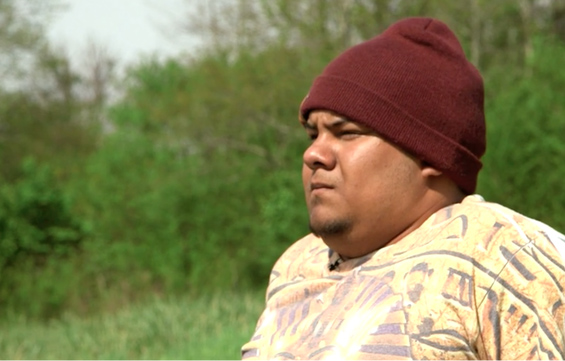We first meet the protagonists of this involving documentary in 2014 as they’re graduating high school in Georgia. Alejandro seems wiser than his years and is a talented artist; Silvia, aka Lily, aspires to become a nurse; and Aldo wants to pursue a career in engineering. Each arrived in the country as a child with parents who are undocumented immigrants, and they’ve since become beneficiaries of the Deferred Action for Childhood Arrivals program, aka DACA. While they can work legally in the United States and have a temporary reprieve from deportation, they must pay out-of-state tuition rates to attend public universities and are ineligible for most forms of financial aid, per state law.
The film follows the three as they fight for their dreams of a college education, which leads them to join forces with other DACA beneficiaries. Together, they engage in campus sit-ins and other demonstrations, going toe-to-toe with police, and it’s during this section that the youths’ bravery and resourcefulness shine through. Though arrested and hauled off to the county jail, they make sure to record every second of their activism to post on the Internet, thereby raising greater awareness of their plight. Eventually, that gets them noticed by several private liberal arts colleges outside Georgia who offer to interview them for admission, although there’s no guarantee that Alejandro, Silvia, and Aldo will get into the school of their choice.
Directors Anayansi Prado and Heather Courtney capture their three subjects at an age in which most young people are dragging their heels when it comes to entering adulthood. Here that’s true as well, to a certain degree, as Aldo still goofs around for photographs, and when it comes to speaking out during rallies, he’s not a charismatic orator. In contrast, early on Alejandro is the most mature and responsible. He has a job at a cake factory, but on his day off he helps with household chores, including prepping meals ahead of time for his family. All three young people are very different from each other, and it’s fascinating to watch how they each deal with the same opportunities and obstacles.
The film is a constant tug-of-war between hope and despair, and just when it looks like things might break right for the youths, reality delivers a gun punch. One of the most heartbreaking moments is when the Georgia State Senate seems on the verge of passing a resolution that would let DACA recipients pay in-state tuition rates—at a session in which Silvia delivers a heartfelt plea in front of various politicians, no less. But then a conservative hatemonger, who can barely conceal his racism and xenophobia—though he does attempt to mask it under the guise of national security—tanks the legislation.
Through it all, the film never loses sight of the parents’ generation, recording their stories of the harrowing border crossings they endured in hopes of better lives. They’re inspiring as a whole. Despite their tenuous present-day circumstances, in which something as routine as a traffic stop can lead to serious jeopardy—even deportation, due to their lack of legal papers—they are largely optimistic about the future.
We also get a real sense of how close-knit these family units are, which threatens to be a double-edged sword as Alejandro worries about going away for college, lest something happens to his parents while he is absent. Others do go away, and in their loneliness find a way back home through actions that might be viewed as self-sabotaging or, on the contrary, may be viewed as a reaffirmation of a better tomorrow.
The style of the film involves a lot of one-on-one interviews with the subjects, and so viewers become party to their innermost anxieties, but it is through their actions that they live up to this documentary’s namesake.
The Unafraid will screen on June 21 as part of the Human Rights Watch Festival.







Leave A Comment